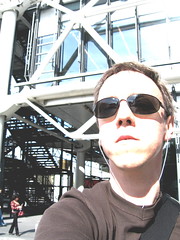eScience and Transformative Technology
This Friday I'll be speaking at the Ikon Gallery Birmingham, as part of the e-Science for the Arts series organised by the Visualisation Research Unit. I've loosely live-blogged my notes from the first two sessions over at Futurilla, and it's been worth attending the events if only to enjoy being infuriated/exasperated/inspired by the nature of attending artists/designers' engagement with digital culture and technologies. For every sensitive collaboration of the human and the digital there are three art/design hacks railing against the hegemony of the computer and proclaiming it a fancy electronic paintbrush, accessible only through the high priests of technology, and protected by obscure arcane incantations. My purpose, as I see it, is to offer up an alternative to this world-view, perhaps more akin to that of modern futurists like Ray Kurzweil, one in which digital technologies differ in startling ways from their analogue predecessors, and transform the domains they touch in ways not predicted by a simplistic view of the computer as a digital paintbrush.
The main theme of my presentation will be the contrast between these two world views – of digital technology as a tool and as an environment – and the implications for arts practice which flow from these positions. I'll draw upon the experience of configuring the Visualisation Research Unit for illustration, and try to articulate some of the challenges in embracing the environment model within e-arts practice. Finally I'll touch upon some of the long-term implications this perspective uncovers, implications which are challenging, disruptive, and dramatically transformative.
Technorati Tags: Art, Birmingham UK, Computing, Conferences, Creativity, Design, Futurilla, Networks, Science, Software, technology, Transformative


2 Comments:
Very intersting Rob. I would have come if I had been knew. I enjoy your comment about people complaining about digital media being..
"accessible only through the high priests of technology"
as of course that is an exact discption of the situation for students at BIAD!!
If students themselves are taught in an environment where they are prevented from accessing technology with authority from IT people as happemns in the "Digital"room then it seems to me that they will either become entirly dependent on these "experts" for their creative output or resist the technology itself.
An apposite observation: I too am increasingly of the opinion that we're responsible for such attitudes towards technology, and that it's no longer good enough for us to complain about students (and indeed artists "not getting it". We're the generation of lecturers playing midwife to the digital natives, and too often we're paralysed by a terror of letting them go, as if we're afraid that their vision of the future won't match our own. Our fear is of course justified, and in the long term we'll be eaten by our own young, just as we should be.
Post a Comment
<< Home